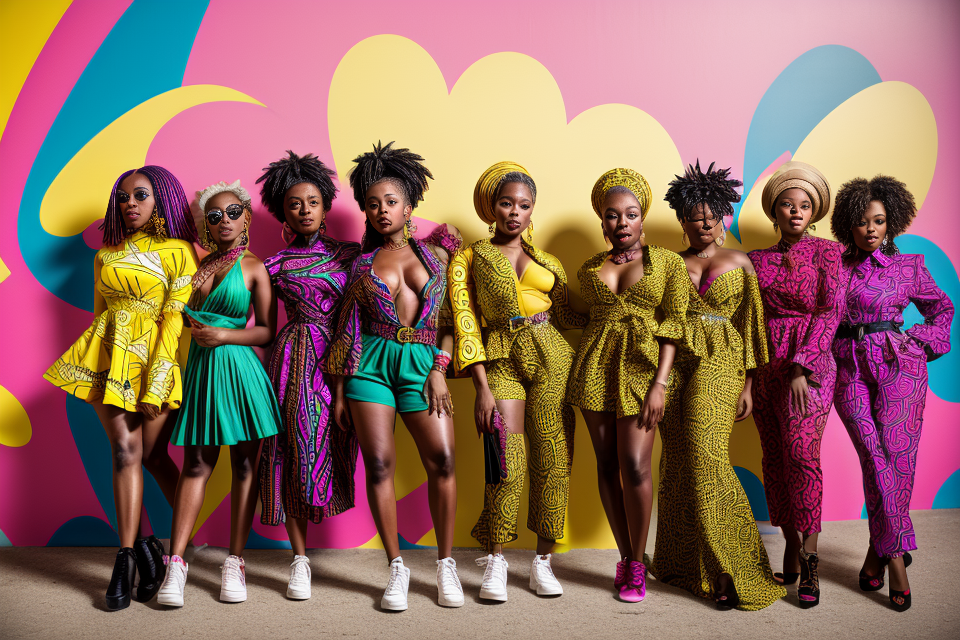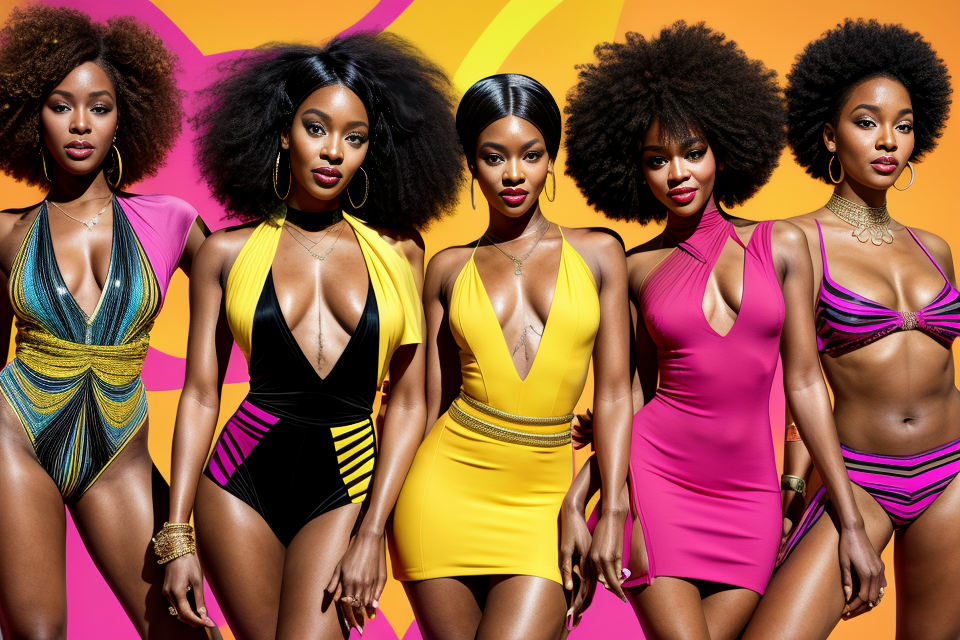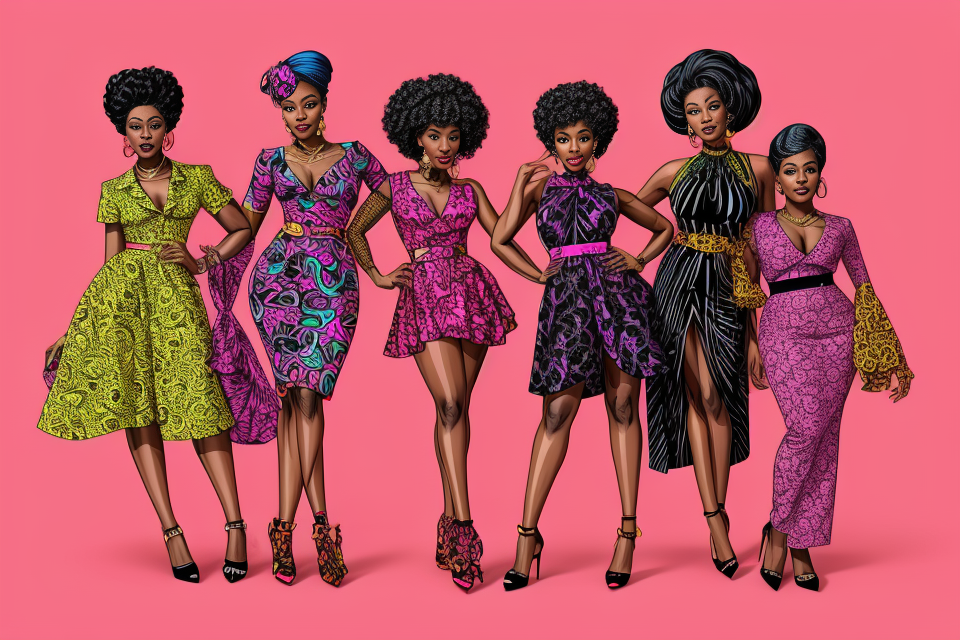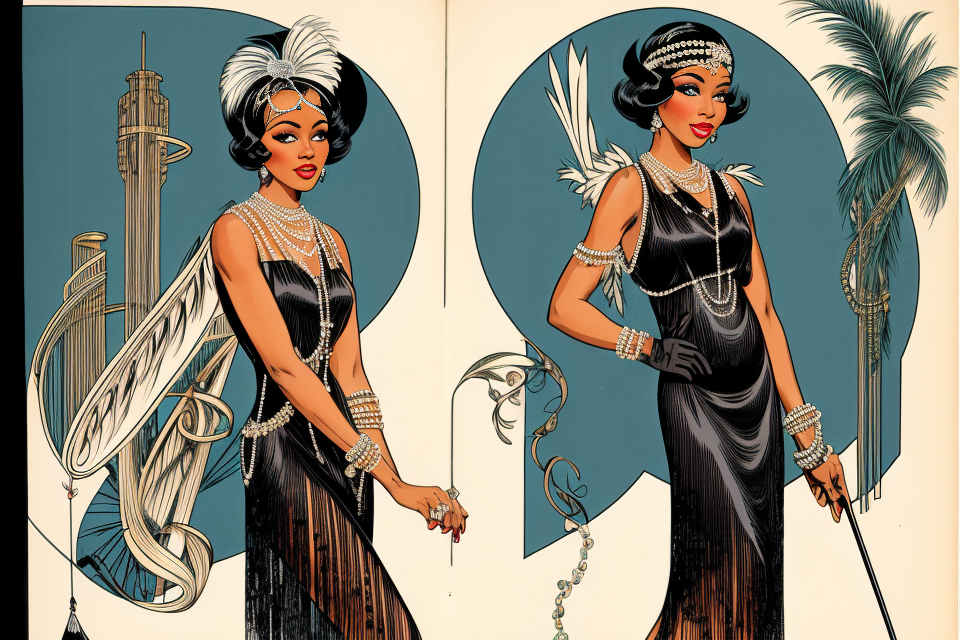Fashion is a form of self-expression that transcends cultural boundaries. Black culture has played a significant role in shaping fashion trends for women, especially in recent years. From hip-hop to Afro-centric styles, black culture has been a driving force behind many of the fashion trends that have taken the world by storm. This article explores the ways in which black culture has influenced fashion, particularly for women, and how it has become a source of inspiration for designers and fashion lovers alike.
Black culture has played a significant role in shaping fashion trends for women. Black women have historically been trendsetters, pushing boundaries and embracing their unique style. From the iconic afros of the 1970s to the statement-making streetwear of today, black culture has had a profound impact on women’s fashion. From the runway to the streets, black women continue to inspire and influence fashion trends with their creativity, boldness, and sense of self. The fusion of traditional African garments with contemporary styles, as well as the celebration of black beauty and diversity, have all contributed to the ever-evolving and dynamic landscape of women’s fashion.
The history of black culture in fashion
==========================================
Black culture has played a significant role in shaping fashion trends for women. The history of black culture in fashion can be traced back to the 1960s, when black models such as Naomi Campbell, Iman, and Tyra Banks began to gain prominence in the fashion industry. These models broke down barriers and opened doors for future generations of black models, as well as helped to redefine beauty standards in the fashion industry.
The influence of black culture on fashion has continued to grow over the years, with many designers incorporating elements of black culture into their designs. For example, in the 1980s, black designers such as Patrick Kelly and Willi Smith gained recognition for their innovative and eclectic designs, which blended elements of black culture with high-end fashion.
More recently, designers such as Stella Jean and Aurora James have continued to push the boundaries of fashion by incorporating elements of black culture into their designs. Their work has helped to raise awareness of the contributions of black culture to the fashion industry and has inspired a new generation of designers to embrace and celebrate their cultural heritage.
In addition to the work of designers, black culture has also had a significant impact on streetwear fashion. Brands such as Supreme and Off-White have been known to incorporate elements of black culture into their designs, including hip-hop and graffiti art. This has helped to bring black culture to a wider audience and has played a significant role in shaping the current streetwear trend.
Overall, the history of black culture in fashion is a rich and complex one, full of influential figures and groundbreaking designs. Its impact on the fashion industry continues to be felt today, as designers and brands continue to embrace and celebrate the contributions of black culture to the world of fashion.
The impact of black fashion on mainstream fashion
- The integration of black culture into mainstream fashion
Black culture has had a profound impact on mainstream fashion, as designers and brands have increasingly looked to the unique styles and aesthetics of black communities for inspiration. This integration has been driven by a growing recognition of the importance of diversity and inclusivity in the fashion industry, as well as a desire to tap into the creativity and innovation that has long characterized black fashion. - The rise of black designers in the fashion industry
One of the most significant ways in which black culture has influenced mainstream fashion is through the rise of black designers. In recent years, a number of talented black designers have gained recognition for their innovative and socially conscious designs, which often draw on the rich traditions and cultural heritage of black communities. These designers have helped to challenge traditional notions of what fashion is and who it is for, and have inspired a new generation of designers and fashion enthusiasts to embrace a more inclusive and diverse approach to fashion.
The role of social media in promoting black fashion
The impact of Instagram and TikTok on black fashion trends
In recent years, social media platforms such as Instagram and TikTok have played a significant role in shaping fashion trends, particularly for black women. These platforms have provided a space for black women to showcase their unique styles and express their individuality, which has influenced the broader fashion industry.
One notable example is the popularity of the “African-print” trend, which involves wearing clothing featuring traditional African patterns and fabrics. This trend gained traction on social media, with influencers and celebrities showcasing the print in various styles and contexts. As a result, the trend has become more mainstream, with major fashion brands incorporating African-inspired prints into their collections.
How social media has created a platform for black fashion influencers
Social media has also created a platform for black fashion influencers to showcase their style and gain a following. These influencers have played a significant role in shaping fashion trends for black women by sharing their personal styles and highlighting new designers and brands.
For example, influencers such as Nykhor Paul and Joan Smalls have used their platforms to showcase the beauty and diversity of black women’s hair, highlighting natural hairstyles and encouraging a more inclusive approach to beauty standards. Similarly, influencers such as Sydni Craig-Hart and Blake Lively have promoted the work of black designers and encouraged their followers to support and shop from these designers.
Overall, the impact of social media on black fashion cannot be overstated. These platforms have provided a space for black women to express their individuality and influence the broader fashion industry, and they will continue to play a significant role in shaping fashion trends for women in the years to come.
Black fashion trends for women
=================================
Black culture has had a significant impact on fashion trends for women. The following are some of the ways in which black culture has influenced fashion trends for women:
Bold colors and prints
Black culture has played a significant role in popularizing bold colors and prints in women’s fashion. The use of bright colors and bold prints is a common feature of traditional African textiles, and this aesthetic has been adopted by many designers and fashion houses.
African-inspired textiles
African-inspired textiles have also been a significant influence on women’s fashion. Many designers have incorporated traditional African fabrics such as Ankara, Kente, and Adire into their collections, bringing a unique and vibrant aesthetic to the fashion world.
Natural hair
The natural hair movement has also been heavily influenced by black culture. Many women have embraced their natural hair textures and styles, rejecting the traditional standard of straight hair. This has led to an increase in the popularity of protective styles, such as braids, twists, and afros, which have become a staple of many fashion trends.
Streetwear
Black culture has also played a significant role in the rise of streetwear. Many designers have drawn inspiration from hip-hop and urban culture, incorporating elements such as oversized silhouettes, sneakers, and graphic tees into their collections.
Overall, black culture has had a profound impact on fashion trends for women. From bold colors and prints to African-inspired textiles and natural hair, black culture has brought a unique and vibrant aesthetic to the fashion world.
Streetwear and athleisure
The rise of streetwear and athleisure in black fashion
- The evolution of streetwear and athleisure in the fashion industry
- The role of black culture in popularizing these trends
- The impact of social media on the spread of streetwear and athleisure
How black women have embraced these trends
- The ways in which black women have incorporated streetwear and athleisure into their wardrobes
- The importance of comfort and functionality in the choices of black women
- The influence of black female celebrities and influencers on the adoption of streetwear and athleisure
Streetwear and athleisure have become increasingly popular in recent years, with many people embracing these trends as a way to express their personal style. These styles have their roots in black culture, with many of the key pieces and designs originating from black communities.
One of the main reasons for the rise of streetwear and athleisure is the increasing importance of comfort and functionality in fashion. Many people are looking for clothing that is comfortable and easy to move in, and streetwear and athleisure brands have responded to this demand by creating clothing that is both stylish and practical.
Black women have been particularly drawn to streetwear and athleisure, with many embracing these styles as a way to express their unique sense of style. This has been helped by the influence of black female celebrities and influencers, who have helped to popularize these trends and make them more accessible to a wider audience.
Social media has also played a significant role in the spread of streetwear and athleisure, with many people using platforms like Instagram and TikTok to share their outfits and get inspiration from others. This has helped to create a sense of community around these trends, with many people feeling connected to others who share their love of streetwear and athleisure.
Overall, the rise of streetwear and athleisure in black fashion is a reflection of the increasing importance of comfort and functionality in fashion, as well as the growing influence of black culture on mainstream fashion trends. As these trends continue to evolve and develop, it will be interesting to see how they shape the future of fashion for women.
Natural hair and accessories
The impact of natural hair and accessories on black fashion
The influence of black culture on fashion trends for women has been significant in recent years, particularly in the realm of natural hair and accessories. Natural hair has become a prominent aspect of black fashion, as more and more women embrace their natural texture and opt for minimally processed hairstyles. This shift towards natural hair has also been reflected in the fashion industry, with brands and designers showcasing natural hair in their campaigns and runway shows.
Accessories have also played a significant role in shaping black fashion trends for women. Statement jewelry, such as chunky necklaces and bold earrings, have become popular among black women, and have been featured prominently in runway shows and fashion editorials. These accessories often draw inspiration from traditional African jewelry, and have become a way for black women to express their cultural heritage through their fashion choices.
Black women have embraced the natural hair and accessories trends in a variety of ways. Many have taken to social media to share their natural hair journeys, and to connect with other women who have made the switch to natural hair. These online communities have become a source of support and inspiration for black women, and have helped to further popularize natural hair and accessories as a fashion trend.
In addition, black-owned businesses have emerged to cater to the demand for natural hair and accessories. These businesses offer a range of products and services, from hair care and styling products to natural hair extensions and wigs. By supporting these businesses, black women are able to not only embrace their natural hair and accessories, but also support the growth and success of other black-owned businesses.
Overall, the influence of black culture on fashion trends for women has been significant, particularly in the realm of natural hair and accessories. As more and more black women embrace their natural beauty and cultural heritage, these trends are likely to continue to shape the fashion industry and beyond.
Vintage and second-hand clothing
The rise of vintage and second-hand clothing in black fashion
In recent years, vintage and second-hand clothing have become increasingly popular in black fashion. This trend can be attributed to several factors, including the desire for unique and sustainable fashion options, as well as the growing interest in preserving and celebrating black history and culture.
Black women have played a significant role in popularizing vintage and second-hand clothing. Many have embraced these trends as a way to express their individuality and to pay homage to the styles of the past. Additionally, the affordability and sustainability of vintage and second-hand clothing make it an attractive option for many black women who are looking for fashionable options that do not break the bank.
Moreover, black women have also been instrumental in reinterpreting vintage styles and making them relevant to contemporary fashion. They have taken classic silhouettes and given them a modern twist, often incorporating elements of hip-hop and streetwear into their looks. This has helped to further establish vintage and second-hand clothing as a significant trend in black fashion.
Overall, the rise of vintage and second-hand clothing in black fashion reflects a growing appreciation for the past and a desire to preserve and celebrate black culture and history. As black women continue to embrace these trends, it is likely that they will continue to shape the direction of fashion for women in the years to come.
Black fashion and cultural appropriation
============================================
Black culture has had a significant impact on fashion trends for women, particularly in terms of the use of certain fabrics, colors, and styles. However, it is important to consider the issue of cultural appropriation when examining this influence.
Cultural appropriation refers to the taking of elements of one culture by another culture, particularly if that taking is done without understanding or respect for the original culture. In the context of fashion, this can involve the use of styles, fabrics, and other elements that are deeply rooted in black culture, without acknowledging or compensating the creators of those styles.
One example of this is the use of Afrocentric styles, such as braids and headwraps, by non-black individuals without understanding their cultural significance. This can be seen as a form of exploitation, as these styles have been created and developed by black people over centuries, and have deep cultural and historical roots.
Another example is the use of black-created music and dance styles, such as hip-hop and dancehall, by non-black performers without acknowledging their origins. This can be seen as a form of cultural theft, as these styles have been created and developed by black people, and are an important part of black culture.
It is important to recognize the impact of cultural appropriation on black culture, and to acknowledge the ways in which black culture has influenced fashion trends for women. By doing so, we can work towards a more inclusive and respectful fashion industry that recognizes and values the contributions of all cultures.
The history of cultural appropriation in fashion
The history of cultural appropriation in fashion dates back to the early 20th century when fashion designers began borrowing elements from various cultures, including black culture, to create new styles. This appropriation of black culture by the fashion industry has been a contentious issue, with many arguing that it perpetuates racism and exploits the creativity of black communities.
One of the earliest examples of cultural appropriation in fashion was the use of African-inspired textiles and patterns by European designers in the 1920s. This trend continued into the 1960s, with designers incorporating elements of African and Afro-Caribbean cultures into their collections. However, this appropriation was often done without proper acknowledgment or compensation to the original cultural sources.
In the 1980s and 1990s, hip-hop culture became a major influence on fashion, with black artists and designers creating new styles that were heavily influenced by their cultural backgrounds. However, many mainstream fashion designers appropriated these styles without proper recognition or compensation to the black community. For example, high-end fashion brands such as Gucci and Versace began producing clothing items with bold African-inspired prints and logos, which they marketed as their own original designs.
The impact of cultural appropriation on black fashion cannot be overstated. By appropriating black culture, fashion designers have historically denied black people the credit they deserve for creating innovative and influential styles. This has led to a lack of representation and opportunities for black designers and models in the fashion industry. Furthermore, the appropriation of black culture without proper acknowledgment or compensation perpetuates systemic racism and reinforces the notion that black culture is not valuable or worthy of recognition.
In recent years, there has been a growing awareness of the issue of cultural appropriation in fashion, with many calling for greater diversity and inclusivity in the industry. Some fashion brands have begun to collaborate with black designers and models to create more authentic and respectful representations of black culture in fashion. However, much work still needs to be done to ensure that black culture is not appropriated but rather celebrated and respected in the fashion industry.
The role of fashion in addressing cultural appropriation
Fashion has long been a form of self-expression, allowing individuals to showcase their unique style and identity. However, it has also been a platform for cultural appropriation, where dominant cultures take elements from marginalized cultures without proper respect or understanding. In the context of black culture and fashion, it is crucial to address cultural appropriation and recognize the significant role that fashion plays in this process.
How fashion can be used to combat cultural appropriation
- Acknowledging the origins: Fashion can play a vital role in acknowledging the origins of various styles and trends. By giving credit to the cultures that have inspired particular styles, fashion can help educate individuals about the history and significance of these styles, fostering a deeper understanding and appreciation for the cultures they originate from.
- Supporting black-owned businesses: By consciously choosing to support black-owned fashion businesses, consumers can actively contribute to the growth and sustainability of these businesses. This support not only empowers black entrepreneurs but also encourages the development of diverse fashion platforms that accurately represent and celebrate black culture.
- Promoting cultural exchange: Fashion can be a tool for promoting cultural exchange and understanding. By showcasing the richness and diversity of black culture through fashion, individuals from different backgrounds can gain insight into the various traditions, beliefs, and styles that make up this culture. This promotes a more inclusive and tolerant society, where different cultures can coexist and learn from one another.
The importance of supporting black-owned fashion businesses
- Economic empowerment: Supporting black-owned fashion businesses provides economic empowerment for the black community. By choosing to shop from these businesses, consumers can contribute to the growth and sustainability of these enterprises, which in turn creates job opportunities and stimulates local economies.
- Representation matters: Representation in the fashion industry is crucial for fostering a sense of belonging and pride within the black community. By supporting black-owned fashion businesses, consumers can help ensure that black voices and perspectives are accurately represented in the fashion world, promoting a more inclusive and diverse industry.
- Preserving cultural heritage: Black-owned fashion businesses often serve as a platform for preserving and celebrating the cultural heritage of the black community. By supporting these businesses, consumers can actively participate in the preservation and promotion of black culture, ensuring that it continues to thrive and evolve.
FAQs
1. How has black culture influenced fashion for women?
Black culture has had a significant impact on fashion for women. The styles and trends that emerge from black culture are often bold, vibrant, and confident, reflecting the strength and resilience of the community. For example, the Afrocentric trend that emerged in the 1960s and 1970s celebrated the natural hair and dark skin of black women, which was a radical departure from the Eurocentric beauty standards of the time. Today, this trend continues to influence fashion for women of all races, with braids, afros, and natural hairstyles becoming increasingly popular.
2. What are some examples of black culture influencing fashion for women?
There are many examples of black culture influencing fashion for women. One of the most iconic is the style of the 1970s black power movement, which included dashikis, afros, and bell-bottoms. Another example is the hip-hop culture of the 1980s and 1990s, which brought streetwear and oversized clothing into the mainstream. More recently, the trend of athleisure, which emphasizes comfortable and functional clothing for active lifestyles, has been heavily influenced by black culture and the urban sportswear of the 1990s.
3. How do black women shape fashion trends?
Black women have played a significant role in shaping fashion trends. They have used their creativity and boldness to push the boundaries of fashion and challenge traditional beauty standards. For example, black supermodels like Naomi Campbell and Tyra Banks have broken barriers in the fashion industry and inspired young black women to pursue careers in modeling and fashion. Additionally, black fashion designers like Patrick Kelly and Dapper Dan have used their designs to celebrate black culture and inspire new trends.
4. Is black culture appropriation in fashion?
The appropriation of black culture in fashion is a complex and controversial issue. While some argue that it is a form of cultural exchange and appreciation, others argue that it is a form of exploitation and cultural theft. It is important to recognize the origins and significance of black culture in fashion and to respect the cultural context and history of each trend. It is also important to support and shop from black-owned businesses and designers to ensure that black culture is represented and valued in the fashion industry.



